The other day I was ordering an organic smoothie at a local shop and as I watched her put the kale into the blender and grab a carton of almond milk, I stopped her just in time…
Right before she poured the milk into the blender I asked, “Would you mind if I read the ingredients on that?”
She handed me the carton, and, wouldn’t ya know it… The almond milk was filled with all kinds of crazy ingredients that I’d never use in my smoothies at home…
So I simply asked, “Can you use water instead?”
I personally eat very little dairy and usually opt for nut milks to make smoothies and recipes. Almond, coconut, and cashew milks are great alternatives to dairy – but I don’t buy the majority of popular brands at the store, like Silk, So Delicious, or Almond Breeze. Here’s why…
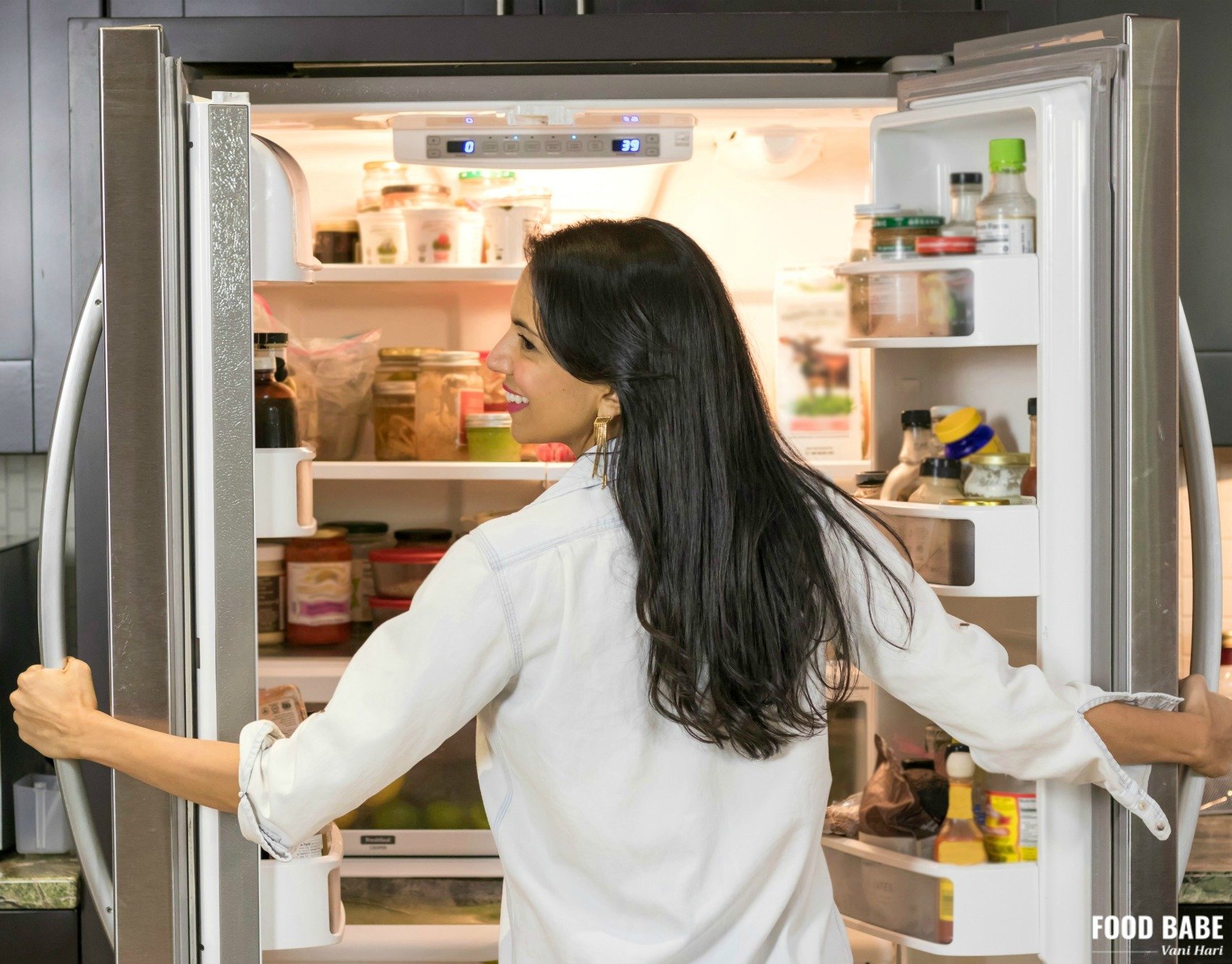
Common ingredients to avoid in dairy-free milk:
Added sugars: Eating too much sugar (which is easy to do, because it’s in almost every processed food) leads to obesity, type 2 diabetes, heart disease, and even cancer (1) – but its detrimental effects can take years to surface. There is no reason to add sugar to milk and we all could use a little less sugar in our life! Some brands have sweetened and unsweetened versions – so always choose the latter. Guilty brands: Silk Original, Almond Breeze, Califia Farms (non-organic), Ripple Original, Milkadamia Original, Pearl Organic Soymilk.
Natural flavors: Natural Flavor is practically the exact same thing as Artificial Flavor, but it’s derived from substances found in nature (plants, animals, etc). Chemists create these complex formulations in a lab, isolating and blending specific flavors extracted from upwards of hundreds of compounds, some of which may be GMOs. These compounds can come from substances that are nowhere close to the actual thing. For example, they might take some castoreum from a beaver (2) to make a flavoring that resembles vanilla – without ever using any vanilla beans. But, hey, it’s “natural” because it’s from a beaver! Common additives in flavors include: sodium benzoate, glycerin, potassium sorbate, and propylene glycol (none are required to be labeled by the FDA). Natural flavors are a complete mystery ingredient and completely unnecessary (3). Guilty brands: Silk, Almond Breeze Vanilla, Califia Farms (non-organic), Ripple, So Delicious, Milkadamia, Pacific Foods Almond, Simple Truth Coconut Milk, Westsoy Vanilla Soymilk, Pearl Organic Soymilk.
Carrageenan & Gums: Carrageenan is linked to intestinal inflammation and cancer (4). Since so much awareness has been raised about the risks of consuming carrageenan, a lot of brands have removed it (yay!) but – they often end up replacing it with gums to thicken the milk, like gellan gum and guar gum. In my opinion, these are safer than carrageenan, but not really something I want to consume often – as they’re linked to bloating and gas (and again, simply unnecessary) (5). Guilty brands: Pacific Rice Milk Original, Simple Truth Coconut Milk, Pearl Organic Soymilk.
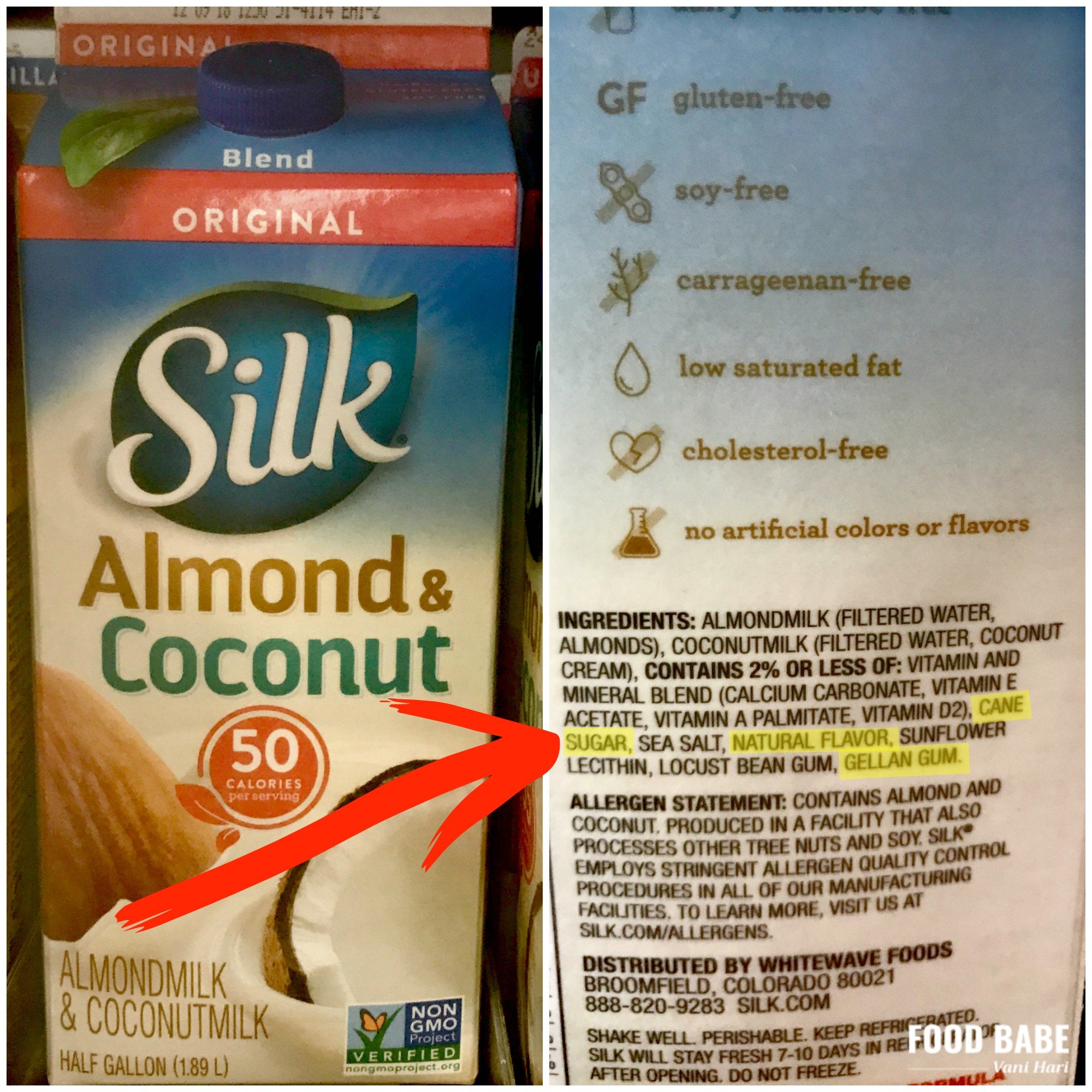
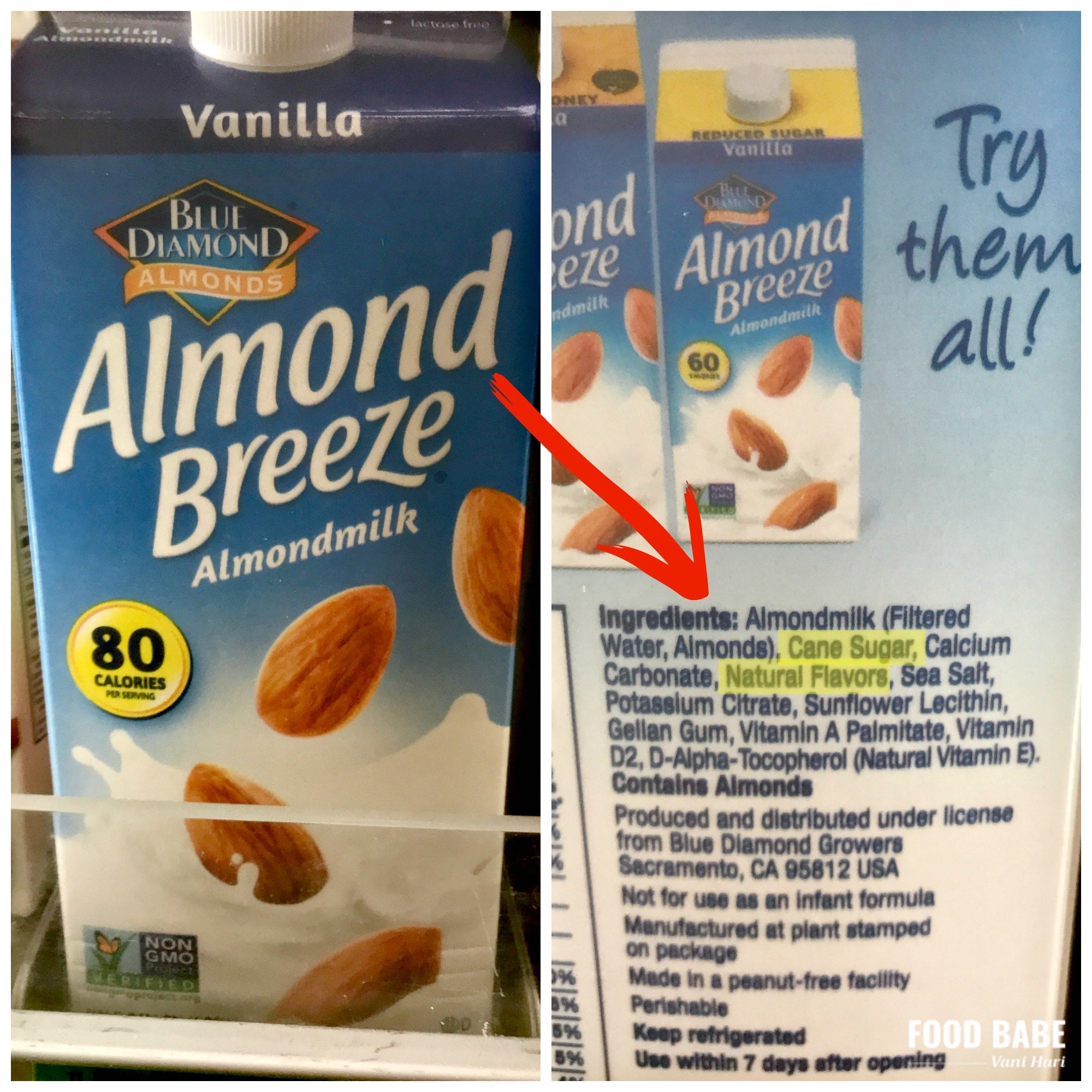
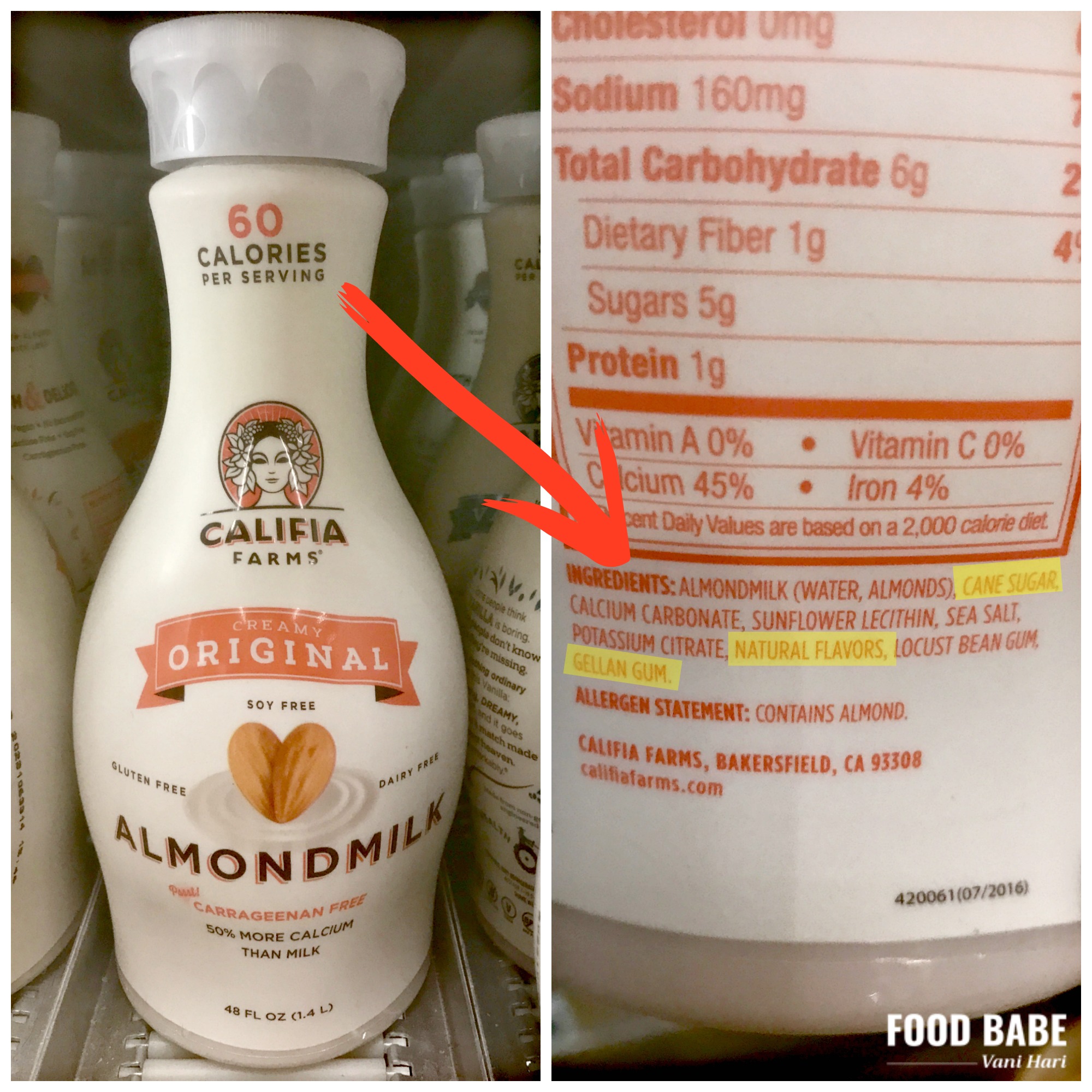

Soy milk… rice milk… almond milk… coconut milk… which one is healthiest?
I get this question a lot. I personally don’t drink soy and rice milks. Here’s why –
Soy can cause hormonal disruptions because it has estrogen-mimicking properties. Soy also has an abundance of phytic acid that leaches calcium and other vital minerals from your body (6). And, if soy milk is not organic it is almost surely made from GMO soybeans. GMO soybeans have been shown to be contaminated with Roundup herbicide, which might end up in your glass of soy milk (7).
As for rice, it is notoriously contaminated with arsenic (a carcinogen) – even organic rice – (8) and tests by Consumer Reports have found arsenic residues in rice milk (9). Unless a brand says that they test their rice milks for arsenic, I don’t feel confident that it is safe. Rice milk is also higher in sugar than most non-dairy milks.
I typically stick with organic coconut and almond milks. Organic store-bought hemp milk or oat milk is hard to find, but is a good choice too.
Oat milk and weedkiller contamination – What you need to know…
Oat milk is gaining in popularity right now and you’ll probably start seeing a lot more of it popping up in coffee shops and stores. Recently the Environmental Working Group (EWG) did some testing (10) and found many popular oat-based cereals, oatmeals, granolas and snack bars contaminated with glyphosate (the active ingredient in Roundup weedkiller). Oat milk wasn’t specifically included in their testing, but it’s good to be aware that conventional oats (non-organic) oats are commonly sprayed with Roundup as a drying agent before harvest, which makes them more likely to be contaminated. Organic oats are not sprayed directly, but are sometimes cross-contaminated. Thankfully, what the EWG found was that organic products were less likely to be contaminated and had far fewer residues than conventional products. The cancer arm of the World Health Organization considers glyphosate to be a probable carcinogen (a substance that causes cancer) – so you don’t want that in your food! That’s why it is safest to look for oat products that are certified organic, and ideally, that have been certified by a third-party to be free of glyphosate.
Oatly is one brand that isn’t organic, but carries the Glyphosate Residue Free certification by The Detox Project. If you buy the Oatly brand, just make sure to pick up what they call the “low fat” version, because Oatly’s regular oat milk contains added rapeseed (canola) oil and other unnecessary additives. I normally wouldn’t recommend a product labeled as “low fat”, but in this case it simply means they didn’t add unhealthy oil to it. And, check out my recipe for homemade organic oat milk below – it’s soooo simple to make.
What about pea protein milks, like Ripple Milk?
Ripple Milk and some other brands like Silk’s Protein Nut Milk and Milkadamia are made with pea protein. I’m now very cautious about consuming pea protein as I learned something very shocking about this ingredient while developing protein powder for my company Truvani...
Our protein powder is made primarily with organic pea protein. We have strict ingredient standards that not all brands have – all ingredients need to be organic, non-GMO, and pass heavy metal testing. We reached out to dozens of ingredient suppliers and every single sample of pea protein failed the heavy metals test and was coming back contaminated with LEAD. I couldn’t believe it. We had such a hard time finding a clean source of pea protein that I thought we would need to scratch the recipe altogether and completely reformulate it without pea protein. We eventually found a pea protein source that passed testing, but it was an exhaustive process that I know most food brands don’t bother doing.
I’m not saying Ripple Milk, Milkadamia, or Silk’s Protein Nut Milk is contaminated with lead. I can’t say that because I haven’t tested them for lead – and I don’t know anyone who has. That being said, given how common lead is in our pea protein supplies, it is a risk and it’s not one that I’m personally willing to take – especially after my personal experience with pea protein! My team has reached out to these companies and we haven’t heard back yet – but we’ll update this blog post when we do.
UPDATE 2/1/19: Following this investigation, Ripple made the following statement on their Instagram page: “We confidently stand by the integrity of our products and we want to give our fans complete peace of mind, so we tested several bottles of each flavor of Ripple Milk for lead. We tested bottles from different production runs, produced over a few months, using a strict EPA-standard testing method (EPA 6020) at an independent laboratory. As expected, all test results came back negative. This means that the amount of lead in the product is either zero, or so small that highly sensitive analytical equipment could not detect it. Thank you for reaching out to us with your concerns! We know how important it is to feel confident about the products you and your family rely on.”
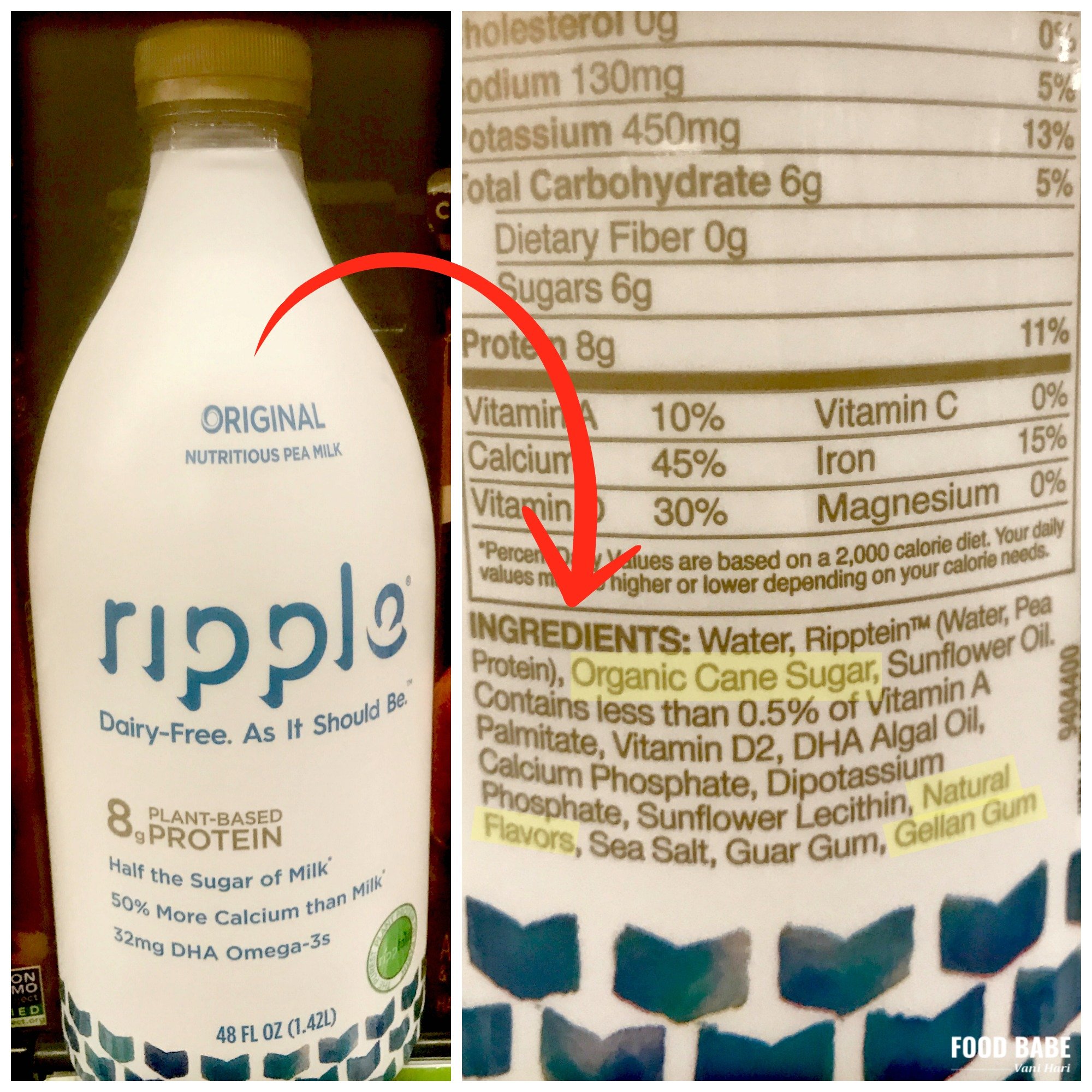 Ripple Milk is not certified organic, contains added flavors, and contains added refined (white) sugar (unless you buy their unsweetened version). Especially watch out for Vanilla Ripple Milk with 15 grams of sugar per serving. I try to avoid added sugar in foods that I’m eating regularly (that are supposed to be healthy!) Think about it: We get bombarded with added sugar all over the place… do we really want it in our daily drinks? I sure don’t.
Ripple Milk is not certified organic, contains added flavors, and contains added refined (white) sugar (unless you buy their unsweetened version). Especially watch out for Vanilla Ripple Milk with 15 grams of sugar per serving. I try to avoid added sugar in foods that I’m eating regularly (that are supposed to be healthy!) Think about it: We get bombarded with added sugar all over the place… do we really want it in our daily drinks? I sure don’t.
How to find the healthiest dairy-free milk brands…
Of course, making homemade dairy-free milk is the best option… but I realize we all don’t have time to soak, blend, strain, and bottle it up every few days! When shopping for almond, coconut, oat and other dairy-free milks follow these two tips:
- Look for a certified organic version to avoid crops treated with synthetic pesticides.
- Don’t assume that all organic milks are healthy. Many dairy-free milks and nut milks are filled with the unnecessary ingredients discussed in this post. So make sure you still check the ingredient list! Choose brands without added sugar, natural flavors, or carrageenan. Also try to find brands that don’t include thickeners like gellan gum, if possible.
Some better brands are MALK Organic Almond and Cashew Milks, Oatly (low fat version), Three Trees Organic Almondmilk, New Barn Organic Almondmilk, Whole Foods 365 Organic Unsweetened Almond Milk, Thrive Market Organic Almond Milk and Organic Oat Milk, Simple Truth Organic Unsweetened Almond Milk, Califia Organic Almond Homestyle Nutmilk, and Native Forest or Natural Value Coconut Milk (canned). Be careful, because these brands may have some other versions with added sugar and flavors.
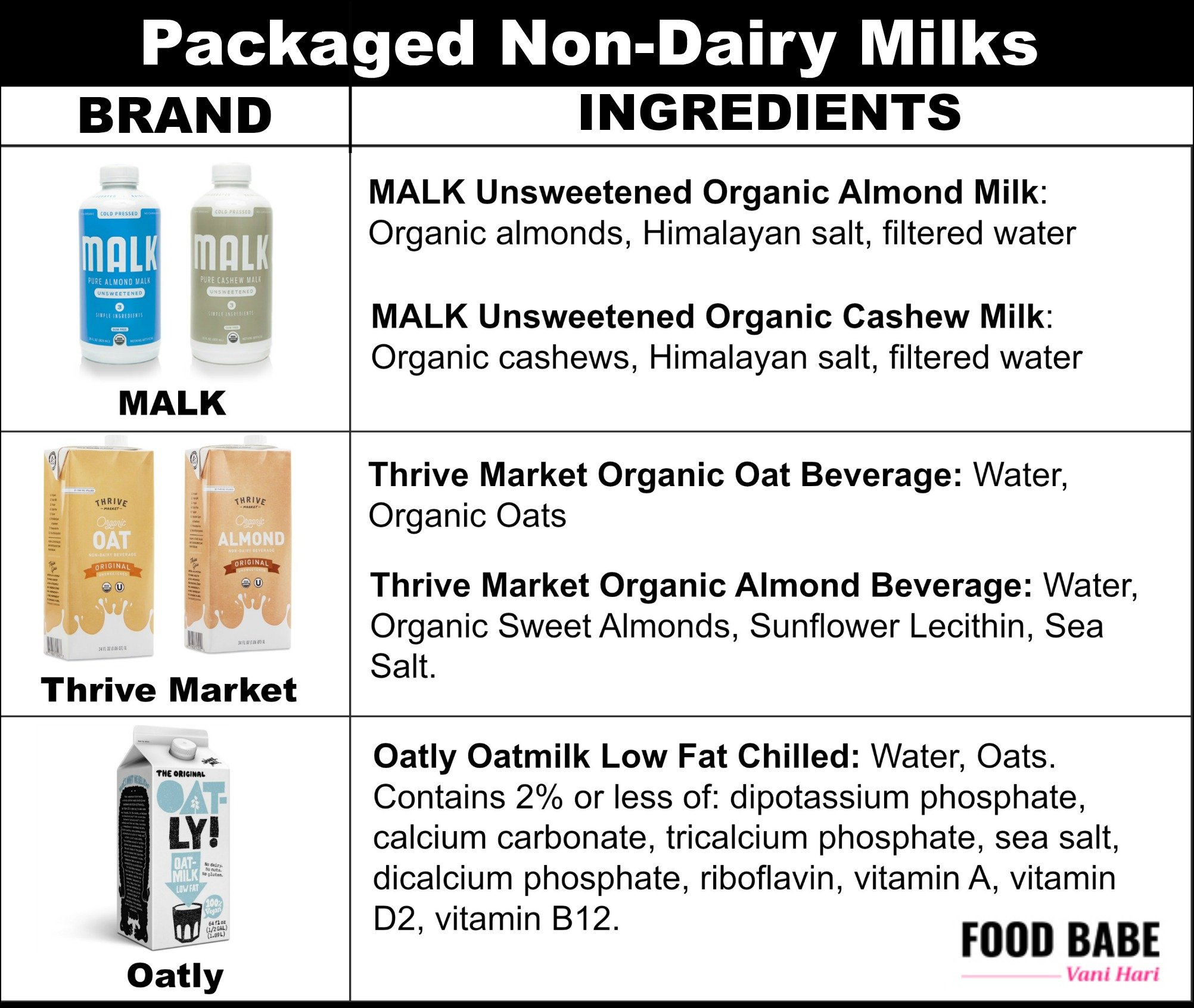

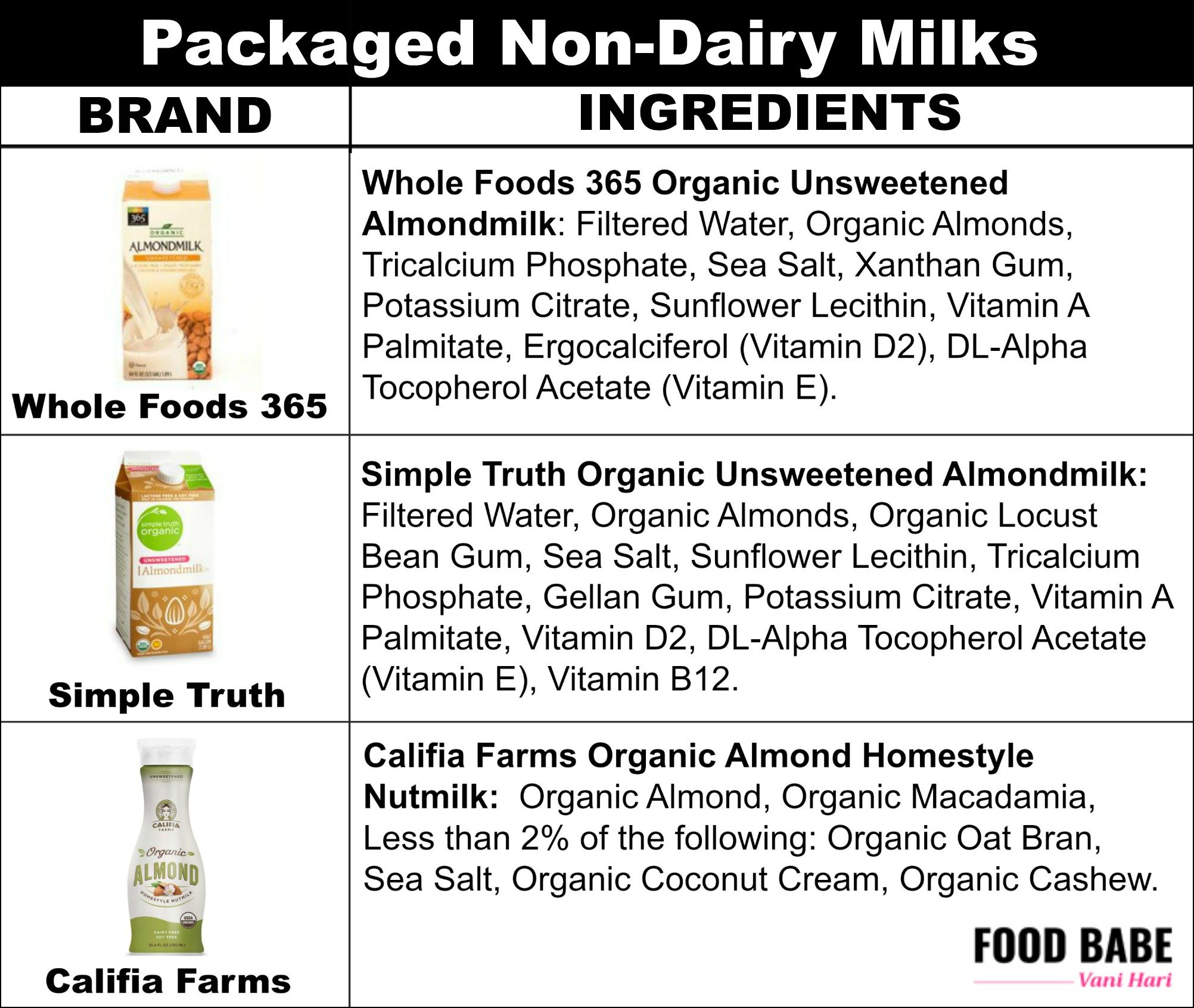
If you’ve got a few minutes… here are the quickest dairy-free milks you can make at home:
- 1 cup raw organic cashews
- 6 cups water
- Optional: 2 dates, pitted (for added sweetness)
- Optional: 1 teaspoon vanilla extract, or seeds of one vanilla bean
- Soak the cashews overnight (at least 6 hours) in 2 cups of water.
- Rinse and drain the soaked cashews.
- Place the cashews, 4 cups of water, and optional ingredients, if using, in a blender and blend on high for about 1 minute.
- Pour the milk into an airtight container and store refrigerated for up to 4 days.
- 1 cup organic rolled oats
- 4 cups filtered water
- Optional: 1 date, pitted (for added sweetness)
- Optional: 1 teaspoon vanilla extract, or seeds of one vanilla bean
- Soak rolled oats in a bowl of filtered water for about one hour.
- Drain the water from the oats and discard this water. Rinse the oats well.
- Place soaked oats in a blender along with 4 cups filtered water. You can use only 3 cups of water if you'd like a thicker milk. Add the vanilla and date, if using. Blend for one minute.
- Using a cheesecloth or fine mesh strainer, strain the blended milk into a glass bowl or container.
- Store in an airtight glass container refrigerated for up to 4 days.
This is how I make homemade coconut milk from a can in less than 5 minutes. And if you’ve got a little bit more time…here is a recipe for fresh pistachio milk that is out of this world.
If you know anyone who likes to use dairy-free milk, but might be buying the wrong brands, please share this post with them!
Xo,
Vani
P.S. I’m giving away a list of every food brand that I buy and personally use in my kitchen to everyone who orders my cookbook, Food Babe Kitchen. This includes all the condiments, staples, snacks, and desserts that you’d find at my house. Claim your copy here.
References:
-
- https://foodbabe.com/the-10-reasons-you-need-a-sugar-detox-right-now/
- https://foodbabe.com/food-babe-tv-do-you-eat-beaver-butt/
- https://foodbabe.com/the-differences-between-artificial-flavors-natural-flavors-organic-flavors-and-other-added-flavors/
- https://foodbabe.com/watch-out-for-this-carcinogen-in-your-organic-food/
- https://foodbabe.com/ingredients-to-avoid/
- https://foodbabe.com/ingredients-to-avoid/
- https://detoxproject.org/glyphosate/potentially-dangerous-levels-of-glyphosate-found-in-gm-soy/
- https://foodbabe.com/asian-citrus-rice-salad/
- https://www.consumerreports.org/cro/magazine/2012/11/arsenic-in-your-food/index.htm
- https://cdn3.ewg.org/sites/default/files/u352/EWG_Glyphosate-2_Table_Full_C02.pdf?_ga=2.165649919.1757022859.1545261591-1946496255.1542655600


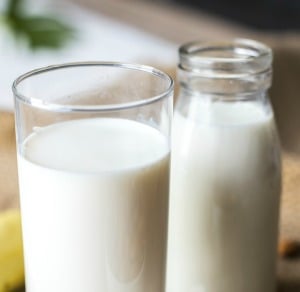










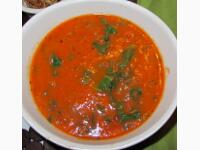

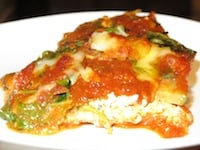


Hi Vani,
what’s your opinion on Happy Planet’s Oat Milks? For Original {non flavoured} is: oat base (filtered water, gluten free oats), tricalcium phosphate, gellan gum, sea salt, natural flavor, vitamin A palmitate, vitamin D2, riboflavin, vitamin B12, zinc gluconate.
For the Vanilla: oat base (filtered water, oats), natural flavor, tricalcium phosphate, gellan gum, sea salt , vitamin A palmitate, vitamin D2, riboflavin, vitamin B12, zinc gluconate
Thanks
Have you researched tigernut milk? It’s the same way you would make any nut milk, but you don’t need to add a sweetner, Its só delicious. I bake with coconut flour and tigernut flour. Let me know if you have or if you well do research.
What about flaxseed milk I buy it from mothers and they pea protein. You mentioned pea protein is contaminated with lead. Have you dinecresearch on flaxseed milk?
Thank you
HI!! what about the costco branded organic almond milk?
Costco Almond Milk also has Organic Cane Sugar, and Gellan Gum
Arent these milk pasteurized for shelf life which makes most of the good enzymes go away ?
Calcium carbonate is a cheap calcium from shell or coral that the body does not recognize and cannot process therefore its got to go somewhere, so it sits in your joints causes arthritis and slowly clogs the arteries. Shouldn’t calcium carbonate be high lighted as an bad ingredient also? The only calcium we should be getting is plant base calcium.
I’ve been using Whole Foods Unsweetened Almond Milk and looked at the label just now and they have added gellan gum!!! Same with the organic Costco brand!
Hi Vani,
Thanks for all your work. Curious about your thoughts on soy. I have largely stayed away from soy because of the claims that it has estrogen-mimicking properties. But I’ve noticed that you have recommended tempeh as a healthy food & that you include tofu as an option in some of your recipes.
If the soy is organic (and non-GMO), do you feel comfortable eating it? If yes, how do you deal with the claims that it is a hormone disrupter?
Thanks so much!
Califia apparently recently added natural flavors to its almond milks. Disappointing to say the least!
The Oatly low fat original milk has a lot of ingredients I’d have to Google. Isn’t that usually a bad sign, if you don’t know what things are or can’t pronounce them?
Almond Milk is contaminated with Glyphosate / Round Up. Is be very careful to drink anything with almonds unless it has 3rd party Glyphosate free certification.
Nice call Thalia. I just read also that many pea milks and plant based protein drinks like Orgain are contaminated with glyphosate. We used to drink Ripple and now we will probably have to give it up. Any suggestions for something that tastes good and is healthy? Is that even possible anymore?
I tried making home made oat milk, but it curdles when I added to coffee. It’s not like store bought ones. How do I avoid this?
There is nothing wrong with organic cane sugar! I’m shocked, honestly, you would think so! You had that ingredient highlighted above. Wow!
What about a non dairy creamer? I have given up coffee because there isn’t a thicker creamier non dairy milk out there without the junk. Any ideas?
Honestly your best bet is heavy cream. There are no carbs in it, unlike non-dairy milks and fake creamers, and unless you are alergic to dairy the full fat is fine.
I have an important question! Does anyone have any information regarding pesticide removal in the soaking phase of producing nut milks? I’m very picky with my nut milks and it’s hard to find a good organic nut milk in a non plastic container, and gum-free, etc. I just want nuts and water, and the only brands that offer that are non organic, that I’ve found, so I’d like to know if pesticides are lost during soaking. I would really appreciate any leads/ information!
Why are you recommending oat milks with added calcium carbonate?
That should be on your “don’t use” list. Check it out.
Why are you recommending oat milk that contain calcium carbonate?
I suggest you read up on it.
Oatly has 7 grams of added sugar in its low-fat milk. They do not list where the added sugar comes from!
Do you have a catalog of calcium , flavor and sweetener free milks?Calcium gives all plant milks a disgusting powdery paint like taste and that much calcium is bad for both the gi system and blood vessels. Try comparing tastes of calcium free milk with calcium rich milk and you will taste the difference.
I am struggling on what milk to give my 16 month old son. I’ve been giving him a brand called “Eden Soy Extra.” Its fortified and soy, but recently I learned this might not be the best option for him after reading this post from Food Babe. He still needs milk in his diet to supplement. I wish I would have breast fed him but it’s too late for that. Any helpful suggestions would be grateful
Im glad others in the comments are acknowledging this too. Avoid calcium carbonate if you can! It’s a harmful ingredient, but found widely in milks.
Can you do a follow up post to this that discusses best non-diary milk for kids to drink. Best nutritional values etc.? That would be so helpful in addition to understanding ingredient.
Hi Vani!
What do you think about Elmhurst line of unsweetened milk specifically the almond milk?
What do you think about Elmhurst Almond milk? It’s my favorite followed by Malk. By the way, I love what you are doing to teach people about reading labels. I have been trying to motivate my friends and family for years!
Is there a milk you recommend for 1year old who is transitioning from breast milk? Or suggestions for healthy options.
I wish folks would do their up to date research on soy before touting false info. I’m a breast cancer survivor. A cup of soy milk has the same estrogen BLOCKING properties as some of the drugs we are given after mastectomies. Those studies were done on animals. Please read Dr. Kristi Funk’s explanation https://www.plantbaseddietsrock.com/the-truth-about-soy/ she’s a prominent breast cancer surgeon.
What about hemp or flax milk?
What about flax or hemp milk?